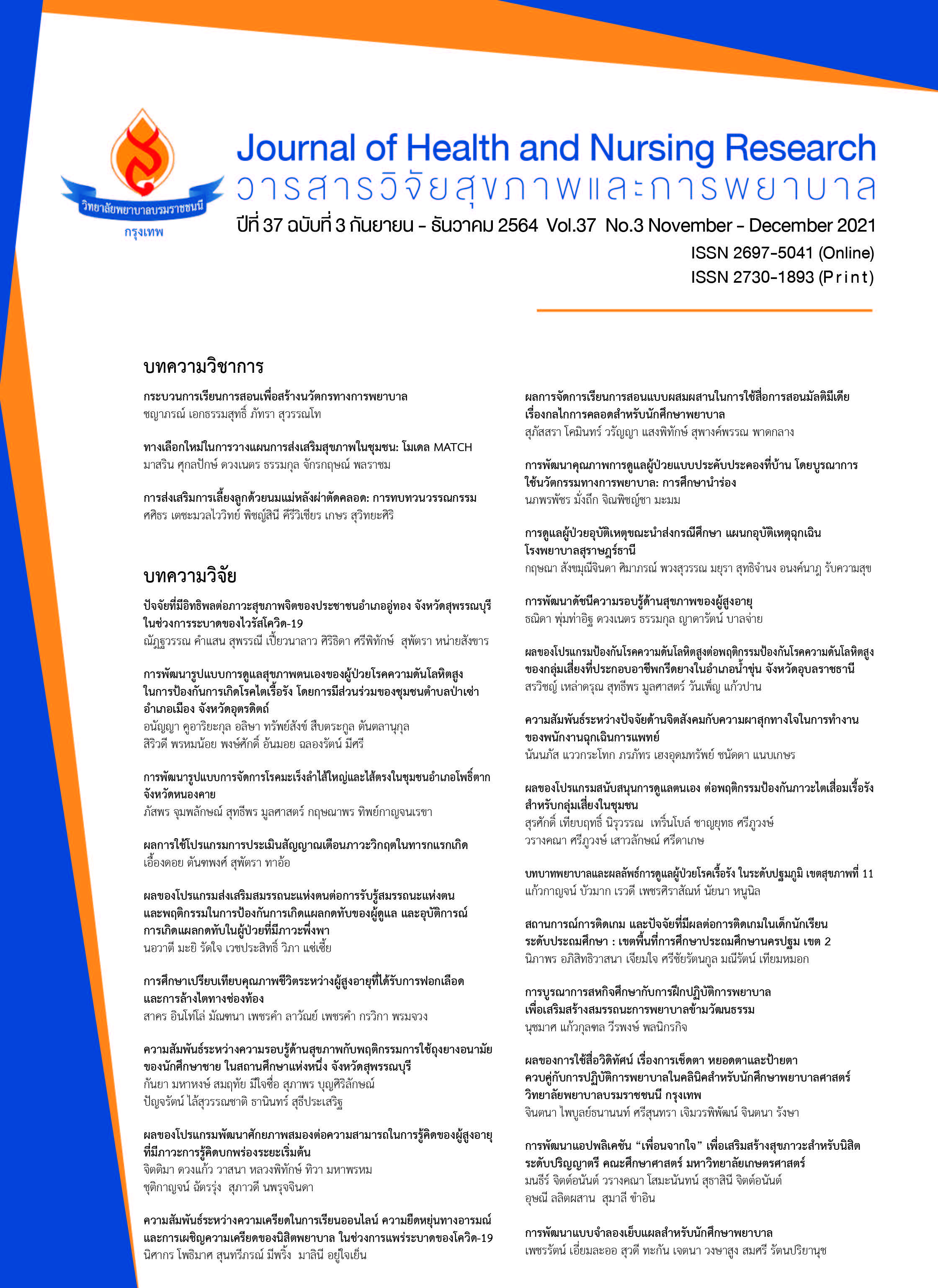ผลของโปรแกรมสนับสนุนการดูแลตนเองต่อพฤติกรรมป้องกันโรคไตเสื่อมเรื้อรัง ของกลุ่มเสี่ยงในชุมชน
คำสำคัญ:
ไตเสื่อมเรื้อรัง, พฤติกรรมการป้องกัน, กลุ่มเสี่ยงบทคัดย่อ
บทนำ: โรคไตวายเรื้อรัง (Chronic Kidney Disease, CKD) เป็นปัญหาสาธารณสุขที่สำคัญของไทยและทั่วโลก ปัจจัยเสี่ยงที่สำคัญของโรคไตเรื้อรัง ได้แก่ โรคความดันโลหิตสูง โรคเบาหวาน และพฤติกรรมสุขภาพ เช่น การรับประทานอาหารที่ไม่เหมาะสม การใช้ยาไม่ถูกต้อง วัตถุประสงค์การวิจัย: มีวัตถุประสงค์เพื่อศึกษาผลของโปรแกรมการป้องกันภาวะไตเสื่อมเรื้อรัง ต่อพฤติกรรมการดูแลตนเอง และผลลัพธ์ทางคลินิก สำหรับกลุ่มเสี่ยงในชุมชนซึ่งมีภาวะการทำงานของไตบกพร่องในระยะ 1-3 ระเบียบวิธีวิจัย: การวิจัยกึ่งทดลอง แบบ 2 กลุ่มวัดก่อน และหลัง กลุ่มตัวอย่าง 60 คน คัดเลือกแบบเจาะจง แบ่งเป็นกลุ่มทดลอง 30 คน และกลุ่มควบคุม 30 คน มี กลุ่มควบคุมได้รับการดูแลปกติ กลุ่มทดลองได้รับโปรแกรมป้องกันไตเสื่อมเรื้อรังโดยประยุกต์ใช้แนวคิดแบบแผนความเชื่อด้านสุขภาพ และการสนับสนุนการดูแลตนเองด้วยเทคนิค 5 เอ เก็บรวบรวมข้อมูลในสัปดาห์ที่ 1 และสัปดาห์ที่ 12 เครื่องมือในการวิจัยประกอบด้วย 1) แบบวัดความรู้เกี่ยวกับเกี่ยวกับโรคไตเสื่อมเรื้อรังที่มีค่าความเชื่อมั่น (KR-20) เท่ากับ 0.77 2) แบบสอบถามการรับรู้ตามแบบแผนความเชื่อด้านสุขภาพเกี่ยวกับโรคไตเสื่อมเรื้อรัง ซึ่งมีค่าสัมประสิทธิ์แอลฟ่าเท่ากับ 0.80 3) แบบสอบถามพฤติกรรมการป้องกันไตเสื่อมเรื้อรัง ซึ่งมีค่าสัมประสิทธิ์แอลฟ่าเท่ากับ 0.78 และ วัดผลลัพธ์ทางคลินิกได้แก่ ค่าระดับซีรั่มครีเอะตินีนและค่าอัตราการกรองของไตตามมาตรฐานของโรงพยาบาล วิเคราะห์ข้อมูลด้วยสถิติเชิงพรรณนา Paired t-test และ Independent t-test ผลการวิจัย: พบว่า กลุ่มทดลองหลังได้รับโปรแกรม มีค่าเฉลี่ยคะแนความรู้เกี่ยวกับโรคไตเสื่อม การรับรู้ตามแบบแผนความเชื่อด้านสุขภาพเกี่ยวกับโรคไตเสื่อมเรื้อรัง พฤติกรรมในการป้องกันไตเสื่อมเรื้อรัง สูงกว่ากลุ่มควบคุมอย่างมีนัยสำคัญทางสถิติ (p< .05) กลุ่มทดลองมีค่าเฉลี่ยซีรั่มครีเอะตินีนและเฉลี่ยค่าอัตรากรองของไตแตกต่างจากกลุ่มควบคุมอย่างมีนัยสำคัญทางสถิติ (p< .05) สรุปผล: โปรแกรมสนับสนุนการดูแลตนเองที่ประยุกต์ใช้แนวคิดแบบแผนความเชื่อด้านสุขภาพ และการสนับสนุนการดูแลตนเองด้วยเทคนิค 5 เอ ทำให้กลุ่มเสี่ยงมีการรับรู้ตามแบบแผนความเชื่อด้านสุขภาพที่ดีขึ้นทำให้เกิดการเปลี่ยนแปลงพฤติกรรมการป้องกันไตเสื่อมเรื้อรัง และผลลัพธ์ทางคลินิกที่ดีได้ ข้อเสนอแนะ: หน่วยงานสาธารณสุขในชุมชน สามารถนำโปรแกรมนี้ ไปประยุกต์ใช้ในการส่งเสริมพฤติกรรมการดูแลตนเองเพื่อชะลอไตเสื่อมเรื้อรังได้
Downloads
เอกสารอ้างอิง
George C, Mogueo A, Okpechi I, Echouffo-Tcheugui JB, Kengne AP. Chronic kidney disease in low-income to middle-income countries: the case for increased screening. BMJ Global Health. 2017;2(2):1-10.
Nathan R. Hill, Samuel T. Fatoba, Jason L. Oke, et, al. Global Prevalence of Chronic Kidney Disease – A Systematic Review and Meta-Analysis. PLOS ONE.11.2016 (7): e0158765. Available from: https://doi.org/10.1371/journal.pone.0158765.
Ingsathit A, Thakkinstian A, Chaiprasert A, Sangthawan P, Gojaseni P, Kiattisunthorn K, Ongaiyooth L, Vanavanan S, Sirivongs D, Thirakhupt P, Mittal B. Prevalence and risk factors of chronic kidney disease in the Thai adult population: Thai SEEK study. Nephrology Dialysis Transplantation 2010;25(5):1567-75.
Krittayaphong, R., Rangsin, R., Thinkhamrop, B. et al. Prevalence of chronic kidney disease associated with cardiac and vascular complications in hypertensive patients: a multicenter, nation-wide study in Thailand. BMC Nephrol 2017;18(115):1-10. (in Thai)
Blakeman T, Protheroe J, Chew-Graham C, Rogers A, Kennedy A. Understanding the management of early-stage chronic kidney disease in primary care: a qualitative study. British Journal of General Practice 2012;62(597):e233-42.
Prakeetavatin J, Moolsart S, Tipkanjanaraykha K, The development of care management for hypertension patients with chronic kidney disease in community. Journal of Health and Nursing Research 2018;34(1):1-13. (in Thai).
Chuakum P, Powwattana A, Thiangthum W, Effects of self–regulation program on chronic kidney disease preventive behavior among uncontrolled type 2 diabetes patients. Journal of Health and Nursing Research 2019; 35(1):130-141. (in Thai).
Krajachan S, Duangpaeng S, Masingboon K. Factors associated with self-management behaviours among patients with chronic disease stage 1-3 in Trat Province. Journal of Boromarajonani College of Nursing, Bangkok 2018;34(1):14-22. (in Thai).
Thanakijjaru P. Current situation of chronic kidney disease in Thailand. J dept med ser. 2015;45(4):5-19. (in Thai)
Hamalee C, Piphavanitcha N, Paokanha R. Effect of the health belief perception promoting program on delaying progression of chronic kidney disease behavior among older adults with type 2 diabetes mellitus at risk of chronic kidney disease. Songklanagarind Journal of Nursing 2014;34:67-85. (in Thai)
Vejakama P, Ingsathit A, Attia J, Thakkinstian A. Epidemiological study of chronic kidney disease progression: a large-scale population-based cohort study. Medicine. 2015;94(4):1-8.
Ankasai C, Limtragool P. Delay of renal funtion deterioration in diabetic nephropathy patients in Praklangung subdistrict’s community, That Panom district, Nakhon Panom province. Journal of Nursing and Health Care 2016;34:6-13. (in Thai).
Zurich P. Health Promotion: Concept, Theory, and Innovation. 2nd edition. Bangkok Green Life Printing House.2017. (in Thai).
Karunan K, Manasurakarn J and Thaniwattananon P. The Effects of an Integrated program of Behavior Modification with Self-Efficacy on Smoking Cessation Behaviors and Self-Efficacy among Patients with Chronic Obstructive Pulmonary Disease. The Southern College Network Journal of Nursing and Public Health 2018;5(1):1-9. (in Thai).
Glasgow RE, Emont S, Miller DC. Assessing delivery of the five ‘As’ for patient-centered counseling. Health Promotion International 2006;21(3):245-55.
Cohen J. Statistical power analysis for the behavioral sciences. Hillsdale, NJ: Laurence Erlbaum Associates. 2013.
Sonjai W, Chanprasert S, Krungkraipetch N. Effect of self-management on health behavior and kidney function of chronic disease patients with impaired renal function stage 2. J of Health Sciences research 2017;12(2):88-97. (in Thai)
Unapha P, Rattanamanee K. Factors related to self-care behaviors to prevent nephrotic complications in chronic kidney patients of Somdetphraphuthlertla Hospital Samutsakhon Province. J of Community Public Health Burapha University: 2012;10(2):44-53. (in Thai).
Unpromme S, Unpromme S, (Translator). Theory of building health. Revised version. Nonthaburi; Praboromrachanok Institute Textbook Project. 2013.(in Thai).
ดาวน์โหลด
เผยแพร่แล้ว
รูปแบบการอ้างอิง
ฉบับ
ประเภทบทความ
สัญญาอนุญาต
บทความที่ได้รับการตีพิมพ์ เป็นลิขสิทธิ์ของวารสารวิจัยสุขภาพและการพยาบาล (วิทยาลัยพยาบาลบรมราชชนนี กรุงเทพ) ไม่สามารถนำไปตีพิมพ์ซ้ำในวารสารฉบับอื่น


















